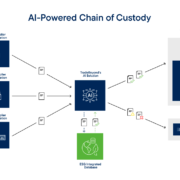Artificial intelligence (AI) and the cloud are now the driving forces for organisations to innovate more sustainably while enhancing customer experiences, adopting just-in-time learning, and embracing digitalisation. Responsible AI, powered by robust analytics, has become a crucial enabler in today‘s technology-driven world, according to industry experts who attended the SAS Innovation Day held in Sandton.
RELATED: Artificial Intelligence in Africa: Levelling the Narrative
Responsible AI refers to the manner in which organisations employ AI technologies while adhering to principles that promote the greater good, safeguard individuals and their fundamental rights, and ensure the trustworthiness of AI applications.
“However, many people still need to acquire a foundational understanding of what AI is and what it is not. One of the most valuable contributions responsible innovators can make is a campaign to raise public awareness about AI. Increased awareness enables adoption, and through adoption, business and public leaders can better comprehend their responsibility to ensure AI technologies are used responsibly,” says Olivier Penel, Head of Global Advisory at SAS.
Although AI has nearly limitless potential, it does not mean that there should be no boundaries. The regulatory environment is developing quickly to provide organisations with legal parameters regarding AI usage. However, catch-up is necessary, especially considering how rapidly platforms like ChatGPT have been adopted since their launch at the end of the previous year.
“It is essential that AI does not discriminate between different groups of people. This can be achieved through proactive monitoring of bias in the data used to train models, in the output of model scoring against diverse groups, and in the fairness of decisions made with predictive models. While all datasets are biased, this can be detected and mitigated,” Penel adds.
According to Paul Morley, Executive Group Data Services at Nedbank, the current digital revolution calls for a different approach than many people might think.
“We got it wrong,” Morley states. “Our understanding of the ‘digital revolution’ was incorrect. It was never about digital, data and AI being integrated into our world and context. It was about us learning to live alongside digital, data and AI.”
“However, these technologies have advanced beyond what was once believed possible – and we now need to find a way to coexist with AI. This entails understanding how to utilise digital technologies and insights to enhance all aspects of our lives. AI affects industries, social wellbeing, jobs, education, hobbies, and entertainment. Nothing is exempt from AI’s impact,” Morley adds.
Morley asserts that this necessitates learning and understanding AI, becoming familiar with it, or risking obsolescence. “AI can fulfil any data role, so people do not need to be experts but should be open to just-in-time learning to benefit from AI and use it for innovation. For instance, AI can optimise data and alter code in real-time. The implications of this are profound. Quite simply, it has the potential to transform everything around us. We must adapt to AI or fall behind.”
Ravi Bhat, Chief Technology Officer at Microsoft Africa, believes that responsible AI should be an integral component of future solutions. It is about incorporating responsible AI into an ecosystem that offers an invaluable platform for sustainable innovation.
“AI advancements continue to significantly contribute to enhancing human productivity, critical thinking, creativity, and accelerating data analytics and management. As with any powerful technology, there is a need for responsibility when creating and working with AI. This necessitates the implementation of appropriate policies to ensure that the technology is developed and used responsibly and ethically.”
By collaborating with a diverse range of people, companies can reinforce their responsible AI ecosystem while developing tailored solutions that meet today‘s customers’ unique needs. Utilising cross-functional teams to focus on enriching AI in relevant ways is a building block for future business success.
“As discussions on AI-related policies intensify, we need approaches that protect privacy and uphold rights while still allowing for positive uses of the technology to continue. To disseminate the benefits of AI as widely as possible, we recommend risk-based strategies that are outcome-focused and adaptable, and that align with international norms and standards so that organisations can collaborate across borders and access state of the art technology,” says Bhat.































